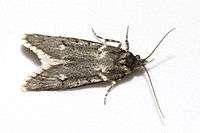Chimabachinae
| Chimabachinae | |
|---|---|
 | |
| Diurnea lipsiella | |
| Scientific classification | |
| Kingdom: | Animalia |
| Phylum: | Arthropoda |
| Class: | Insecta |
| Order: | Lepidoptera |
| Division: | Ditrysia |
| Superfamily: | Gelechioidea |
| Family: | Lypusidae |
| Subfamily: | Chimabachinae Heinemann, 1870 |
| Synonyms | |
| |
Chimabachinae, the chimabachid moths, is a subfamily of moths in the Lypusidae family. The subfamily used to be classified as a subfamily of Oecophoridae, but current phylogenetic research classifies it as a subfamily of Lypusidae. Some authors placed it as the subfamily Cryptolechiinae in the Depressariidae family. The subfamily is distributed in the Palaearctic ecozone, ranging from Europe to Japan, although the blueberry leafroller (Dasystoma salicella) has been introduced to North America.
The wings are broad and rounded and the ocelli are far from the eyes if they are present. The tops of the abdominal segments lack spiny setae which is the case for most related families.
Larvae feed on Betulaceae, Rosaceae and Ericaceae species. They eat the developing leaves, flowers and fruits. They also roll and tie the leaves to make shelters.
Taxonomy and systematics
- Diurnea Haworth, 1811
- Dasystoma Curtis, 1833
Gallery


 Diurnea novembris
Diurnea novembris
References
| Wikimedia Commons has media related to Chimabachinae. |
 Data related to Chimabachinae at Wikispecies
Data related to Chimabachinae at Wikispecies- Chimabachinae at funet
- Chimabachidae at Fauna Europeana